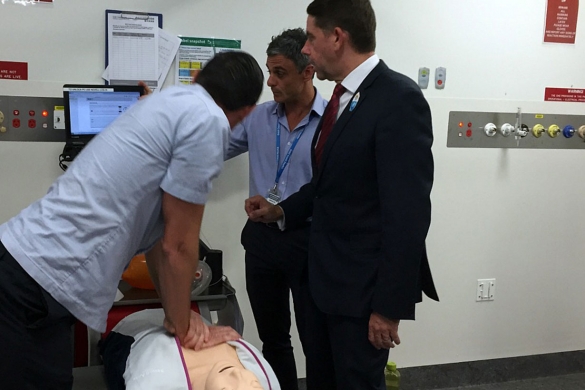
Gold Coast Health is using the latest technology and clinical simulations to foster the talents of the next generation of nurses and midwives.
About 150 graduate registered nurses have joined the health service this year across Gold Coast University and Robina hospitals, with all receiving three months of focused support at the start of their transition year.
Minister for Health and Ambulance Services Cameron Dick today saw the educational opportunities on offer when he met with some of the 53 graduate registered nurses based at Robina Hospital.
“These graduates are receiving three months of focused support at the start of their transition year,” he said.
“In addition to the clinical teams in their units, they also have access to an Entry to Practice team of facilitators to enhance their development and confidence, which is an invaluable resource at this stage of their careers.
“This commitment to the training and education of the next wave of nurses on the ever-growing Gold Coast is essential as we work towards developing the nursing workforce of the future in Queensland.”
Gold Coast Health Nursing/Midwifery Education and Research Unit (NMERU) Director of Nursing Susanne Pearce said the service had invested in resources such as simulation technologies to enhance the development of graduate nurses’ confidence in their clinical practices.
“Those facilities, including the Bond Clinical Education and Research Centre here at Robina Hospital, allow us to deliver innovative scenarios such as recognising and responding to clinical deterioration using high-tech mannequins,” she said.
Gold Coast Health’s graduate registered nurses work across various areas of the health service including surgical, rehabilitation, perioperative, palliative care, dialysis and mental health.
Nurse graduate Carly Youseff, who is based in the Robina Hospital Emergency Department, said she had been impressed by the health service’s commitment to education.
“It’s always a little nerve-racking starting out in your career and that’s why it’s been reassuring to know that so much attention and energy is directed at our ongoing development,” she said.
Mr Dick said the Palaszczuk Government was steaming ahead with implementing its election commitment to employ 4000 nurse graduates – Queensland’s biggest nurse graduate recruitment campaign.
“We are investing more than $110 million into this important initiative to revitalise our nursing workforce statewide, with up to 1000 additional nurse graduates to be injected into Queensland’s Hospital and Health Services every year for four years,” he said.
“We are well on our way to delivering on that commitment, with every single nurse who graduated from a Queensland university in 2015 offered a place in Queensland Health.
“These graduate nurses have joined a system of about 36,000 nurses who are vital to delivering high-quality health care.
“With legislated safe nurse-to-patient ratios being introduced from 1 July, the Palaszczuk Government is making it clear to these graduates that, more than ever, we value Queensland’s nurses.”



